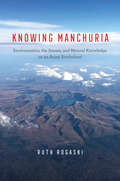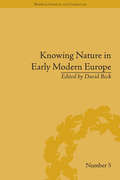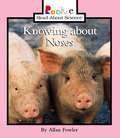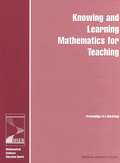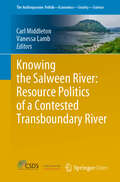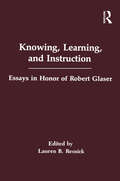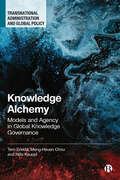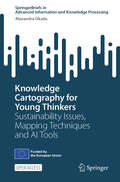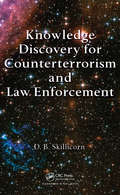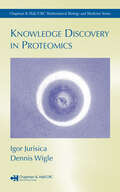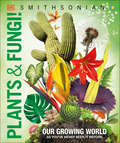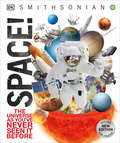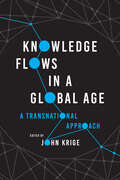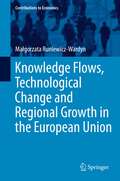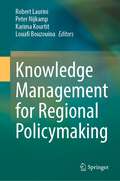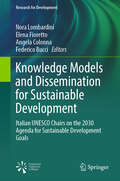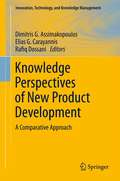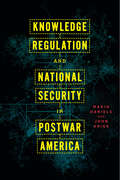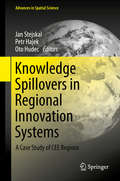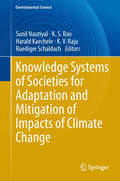- Table View
- List View
Knowing Manchuria: Environments, the Senses, and Natural Knowledge on an Asian Borderland
by Ruth RogaskiMaking sense of nature in one of the world’s most contested borderlands. According to Chinese government reports, hundreds of plague-infected rodents fell from the skies over Gannan county on an April night in 1952. Chinese scientists determined that these flying voles were not native to the region, but were vectors of germ warfare, dispatched over the border by agents of imperialism. Mastery of biology had become a way to claim political mastery over a remote frontier. Beginning with this bizarre incident from the Korean War, Knowing Manchuria places the creation of knowledge about nature at the center of our understanding of a little-known but historically important Asian landscape. At the intersection of China, Russia, Korea, and Mongolia, Manchuria is known as a site of war and environmental extremes, where projects of political control intersected with projects designed to make sense of Manchuria’s multiple environments. Covering more than 500,000 square miles, Manchuria’s landscapes include temperate rainforests, deserts, prairies, cultivated plains, wetlands, and Siberian taiga. With analysis spanning the seventeenth century to the present day, Ruth Rogaski reveals how an array of historical actors—Chinese poets, Manchu shamans, Russian botanists, Korean mathematicians, Japanese bacteriologists, American paleontologists, and indigenous hunters—made sense of the Manchurian frontier. She uncovers how natural knowledge, and thus the nature of Manchuria itself, changed over time, from a sacred “land where the dragon arose” to a global epicenter of contagious disease; from a tragic “wasteland” to an abundant granary that nurtured the hope of a nation.
Knowing Nature in Early Modern Europe (Warwick Series in the Humanities #5)
by David BeckToday we are used to clear divisions between science and the arts. But early modern thinkers had no such distinctions, with ‘knowledge’ being a truly interdisciplinary pursuit. Each chapter of this collection presents a case study from a different area of knowledge.
Knowing about Noses
by Allan FowlerFrom friendly dolphins to giant pandas, from icebergs and glaciers to energy from the sun, from magnets to solids, liquids, and gases, Rookie Read-About Science is a natural addition to the primary-grade classroom with books that cover every part of the science curricula. Includes: animals, nature, scientific principles, the environment, weather, and much more!
Knowing and Learning Mathematics for Teaching
by Mathematics Teacher Preparation Content Workshop Program Steering CommitteeThere are many questions about the mathematical preparation teachers need. Recent recommendations from a variety of sources state that reforming teacher preparation in postsecondary institutions is central in providing quality mathematics education to all students. The Mathematics Teacher Preparation Content Workshop examined this problem by considering two central questions: What is the mathematical knowledge teachers need to know in order to teach well? How can teachers develop the mathematical knowledge they need to teach well? The Workshop activities focused on using actual acts of teaching such as examining student work, designing tasks, or posing questions, as a medium for teacher learning. The Workshop proceedings, Knowing and Learning Mathematics for Teaching, is a collection of the papers presented, the activities, and plenary sessions that took place.
Knowing the Salween River: Resource Politics of a Contested Transboundary River (The Anthropocene: Politik—Economics—Society—Science #27)
by Carl Middleton Vanessa LambThis open access book focuses on the Salween River, shared by China, Myanmar, and Thailand, that is increasingly at the heart of pressing regional development debates. The basin supports the livelihoods of over 10 million people, and within it there is great socio-economic, cultural and political diversity. The basin is witnessing intensifying dynamics of resource extraction, alongside large dam construction, conservation and development intervention, that is unfolding within a complex terrain of local, national and transnational governance. With a focus on the contested politics of water and associated resources in the Salween basin, this book offers a collection of empirical case studies that highlights local knowledge and perspectives. Given the paucity of grounded social science studies in this contested basin, this book provides conceptual insights at the intersection of resource governance, development, and politics of knowledge relevant to researchers, policy-makers and practitioners at a time when rapid change is underway.- Fills a significant knowledge gap on a major river in Southeast Asia, with empirical and conceptual contributions- Inter-disciplinary perspective and by a range of writers, including academics, policy-makers and civil society researchers, the majority from within Southeast Asia- New policy insights on a river at the cross-roads of a major political and development transition
Knowing, Learning, and instruction: Essays in Honor of Robert Glaser (Psychology of Education and Instruction Series)
by Lauren B. ResnickCelebrating the 20th anniversary of the Learning Research and Development Center (LRDC) at the University of Pittsburgh, these papers present the most current and innovative research on cognition and instruction. Knowing, Learning, and Instruction pays homage to Robert Glaser, founder of the LRDC, and includes debates and discussions about issues of fundamental importance to the cognitive science of instruction.
Knowledge Alchemy: Models and Agency in Global Knowledge Governance (Transnational Administration and Global Policy)
by Tero Erkkilä Niilo Kauppi Meng-Hsuan ChouThis book introduces the concept of ‘knowledge alchemy’ to capture the generic process of transforming mundane practices and policies of governance into competitive ones following imagined global gold standards. Using examples from North America, Europe and Asia, it explores how knowledge alchemy increasingly informs national and institutional policies and practices on economic performance, higher education, research and innovation. The book examines how governments around the world have embraced global models of world-class university, human capital and talent competition as essential in ensuring national competitiveness. Through its analysis, the book shows how this strongly future-oriented and anticipatory knowledge governance is steered by a surge of global classifications, rankings and indicators, resulting in numerous comparisons of various domains that today form more constraining global policy scripts.
Knowledge And Mind: A Philosophical Introduction
by Andrew Brook Robert J. StaintonThis is the only contemporary text to cover both epistemology and philosophy of the mind at an introductory level.
Knowledge Cartography for Young Thinkers: Sustainability Issues, Mapping Techniques and AI Tools (Advanced Information and Knowledge Processing)
by Alexandra OkadaDiscover the transformative power of knowledge mapping with this revolutionary book. You will have access to a rich collection of mapping techniques, technologies, and real-life applications designed for learners of all ages and across disciplines. This book aims to help learners create knowledge with the support of artificial intelligence mapping apps and engage them deeply with sustainable development supported by green digital skills. Experience the dynamic world of mind maps, concept maps, dialogue maps, and more, brought to life by educators, researchers, experts, and young students. This is not just a book; it is a movement toward diverse, interactive learning methods to shape a sustainable future. Perfect for teachers, trainers, nonformal educators, and education professionals, the book embraces the innovative CARE-KNOW-DO framework to transform how young people tackle pressing issues. It combines exploration, understanding, and actionable steps for sustainability. This book offers invaluable resources to help researchers explore trends, connect relevant information, and produce significant narratives supported by AI. It guides the use of knowledge maps in decision-making, sense-making, and inspiring future generations. The book also explores the methodology behind its creation, including case studies, teaching strategies, and learning outcomes, all of which are grounded in extensive literature and ethical standards. Embrace a new era of learning with this open-access book on knowledge mapping. It is set to transform the way we think, research, teach, and learn. It is an open access book.
Knowledge Discovery for Counterterrorism and Law Enforcement (Chapman & Hall/CRC Data Mining and Knowledge Discovery Series)
by David SkillicornMost of the research aimed at counterterrorism, fraud detection, or other forensic applications assumes that this is a specialized application domain for mainstream knowledge discovery. Unfortunately, knowledge discovery changes completely when the datasets being used have been manipulated in order to conceal some underlying activity. Knowledge Dis
Knowledge Discovery in Proteomics
by Igor Jurisica Dennis WigleMulti-modal representations, the lack of complete and consistent domain theories, rapid evolution of domain knowledge, high dimensionality, and large amounts of missing information - these are challenges inherent in modern proteomics. As our understanding of protein structure and function becomes ever more complicated, we have reached a point where
Knowledge Encyclopedia Plants and Fungi
by DKExplore the wonderful world of plants and fungi, with everything from cacti and carnivorous plants to trees, flowers, and mushrooms.Why are flowers colorful and fruits sweet? How does a carnivorous plant kill its prey? Why do stinging nettles sting? How do trees turn light into food? This ultimate nature book for children will fascinate young readers with its microscopic detail and amazing facts on the plant world. Children aged 9+ will find themselves totally absorbed in the complexities nature, made clear through engaging explanations, intricate illustrations, vivid photographs, and striking 3D images. Knowledge Encyclopedia: Plants and Fungi! teaches kids all about plants and fungi by showing how they work with beautiful illustrations. Peer inside a leaf, watch a seed sprout, follow a root underground, and see how a flower becomes a fruit.This all-encompassing nature encyclopedia for kids offers: A whole collection of facts, charts, timelines, and illustrations that cover a vast range of topics.Plants and fungi from around the world shown using amazingly detailed CGIs that entice young readers to dive in and explore.Important STEM topics covered in life sciences curricula.A visual approach using illustrations, photographs and extremely detailed 3D CGI images.Knowledge Encyclopedia: Plants and Fungi! shows how plants and fungi form the foundations of every ecosystem, making our planet habitable. Life on Earth couldn&’t exist without plants and fungi. Plants create the food we eat and the oxygen we breathe. They regulate the climate, provide habitats for animals, and produce sustainable resources that we can use to make books, clothes, furniture and houses. Fungi are just as important.Every page is packed with incredible facts and statistics. Did you know that the seeds of the Australian snottygobble plant don&’t grow until they&’ve been pooed out by emus? Or that the world&’s oldest tree began growing before the pyramids were built?More in the SeriesKnowledge Encyclopedia Plants and Fungi! is part of DK&’s visual and informative Knowledge Encyclopedia series. Complete the collection and dive into the deep with Knowledge Encyclopedia Ocean!, take a trip to the solar system with Knowledge Encyclopedia Space! and travel back to prehistoric times with Knowledge Encyclopedia Dinosaur!
Knowledge Encyclopedia Space!: The Universe as You've Never Seen it Before (DK Knowledge Encyclopedias)
by DKA spacetastic new edition beaming with incredible pictures and the latest facts about the universe.From the origin of the universe to the future of space rockets, this book about space for kids has it all.Did you know that the moon was once a piece of the Earth, and that a day on Venus is longer than one year? First published in 2015, Knowledge Encyclopedia: Space! has been completely revised and updated for 2020, with new images and information on all things space-related to send you rocketing to the furthest reaches of the cosmos. Newly updated with the latest scientific discoveries and innovation in space engineering, this new title will answer all your questions about what lies beyond the night sky. Discover how stars and galaxies are formed, take a trip through the Milky Way, and explore the innards of the International Space Station in this incredible book that uses the latest computer-generated 3-D imagery, eye-catching photographs, gripping information, and explanatory diagrams to bring the wonders of the cosmos to life.Knowledge Encyclopedia: Space! is the big bang of space books, and it's just gotten bigger!
Knowledge Flows in a Global Age: A Transnational Approach
by John KrigeA transnational approach to understanding and analyzing knowledge circulation. The contributors to this collection focus on what happens to knowledge and know-how at national borders. Rather than treating it as flowing like currents across them, or diffusing out from center to periphery, they stress the human intervention that shapes how knowledge is processed, mobilized, and repurposed in transnational transactions to serve diverse interests, constraints, and environments. The chapters consider both what knowledge travels and how it travels across borders of varying permeability that impede or facilitate its movement. They look closely at a variety of platforms and objects of knowledge, from tangible commodities—like hybrid wheat seeds, penicillin, Robusta coffee, naval weaponry, seed banks, satellites and high-performance computers—to the more conceptual apparatuses of plant phenotype data and statistics. Moreover, this volume decenters the Global North, tracking how knowledge moves along multiple paths across the borders of Mexico, India, Portugal, Guinea-Bissau, the Soviet Union, China, Angola, Palestine and the West Bank, as well as the United States and the United Kingdom. An important new work of transnational history, this collection recasts the way we understand and analyze knowledge circulation.
Knowledge Flows in a Global Age: A Transnational Approach
by John KrigeA transnational approach to understanding and analyzing knowledge circulation. The contributors to this collection focus on what happens to knowledge and know-how at national borders. Rather than treating it as flowing like currents across them, or diffusing out from center to periphery, they stress the human intervention that shapes how knowledge is processed, mobilized, and repurposed in transnational transactions to serve diverse interests, constraints, and environments. The chapters consider both what knowledge travels and how it travels across borders of varying permeability that impede or facilitate its movement. They look closely at a variety of platforms and objects of knowledge, from tangible commodities—like hybrid wheat seeds, penicillin, Robusta coffee, naval weaponry, seed banks, satellites and high-performance computers—to the more conceptual apparatuses of plant phenotype data and statistics. Moreover, this volume decenters the Global North, tracking how knowledge moves along multiple paths across the borders of Mexico, India, Portugal, Guinea-Bissau, the Soviet Union, China, Angola, Palestine and the West Bank, as well as the United States and the United Kingdom. An important new work of transnational history, this collection recasts the way we understand and analyze knowledge circulation.
Knowledge Flows in a Global Age: A Transnational Approach
by John KrigeA transnational approach to understanding and analyzing knowledge circulation. The contributors to this collection focus on what happens to knowledge and know-how at national borders. Rather than treating it as flowing like currents across them, or diffusing out from center to periphery, they stress the human intervention that shapes how knowledge is processed, mobilized, and repurposed in transnational transactions to serve diverse interests, constraints, and environments. The chapters consider both what knowledge travels and how it travels across borders of varying permeability that impede or facilitate its movement. They look closely at a variety of platforms and objects of knowledge, from tangible commodities—like hybrid wheat seeds, penicillin, Robusta coffee, naval weaponry, seed banks, satellites and high-performance computers—to the more conceptual apparatuses of plant phenotype data and statistics. Moreover, this volume decenters the Global North, tracking how knowledge moves along multiple paths across the borders of Mexico, India, Portugal, Guinea-Bissau, the Soviet Union, China, Angola, Palestine and the West Bank, as well as the United States and the United Kingdom. An important new work of transnational history, this collection recasts the way we understand and analyze knowledge circulation.
Knowledge Flows, Technological Change and Regional Growth in the European Union
by Małgorzata Runiewicz-WardynThe book provides conceptual and empirical insights into the complex relationship between knowledge flows and regional growth in the EU. The author critically scrutinizes and enhances the RIS (Regional Innovation System) approach, discussing innovation as a technological, institutional and evolutionary process. Moreover, she advances the ongoing discourse on the role of space and technological proximity in the process of innovation and technological externalities. The book closes with an investigation of the role of technological change and knowledge spillovers in the dynamic growth and "catching-up" of EU regions.
Knowledge Management for Regional Policymaking
by Peter Nijkamp Karima Kourtit Robert Laurini Louafi BouzouinaThe present publication focusses the attention on new avenues in regional information and knowledge management, while we will zoom in particularly on the potential promises and hurdles of digital technology. This digital challenge has already generated a wealth of implications in the area of smart or intelligent cities, but as yet far less has been achieved in the field of regional planning and regional science. There is clearly a need for a more systematic and wide-ranging assessment and presentation of emerging approaches and concepts in this field, for instance, in regard to principles (e.g. geographic rule modeling), methodologies (e.g. blockchain systems), data analytics (e.g. machine learning) and data governance (e.g. data sovereignty) of regional information and knowledge. Especially in our ‘big data’ era, a systematic, comprehensible and reliable acquisition, storage, sharing and handling of data (e.g. on the basis of systematic decomposition and filtering principles) is more needed than ever before. The present study seeks to present a selection of state-of-the-art contributions on advanced – often digitally-oriented – regional information and knowledge management foundations, principles and practices written by several experts in the field of spatial informatics. These contributions were collected with a view to the design of a comprehensive knowledge and research agenda, which was discussed during a brainstorm workshop in Lyon, France (October 2021). This book covers various fields of interest, such as GeoAI, knowledge modelling, IoT and scalability, space syntax, rule extraction, data governance and data self-sovereignty. It is concluded with a knowledge and research agenda outlining future endeavors in the field of the spatial information sciences (or spatial informatics).
Knowledge Models and Dissemination for Sustainable Development: Italian UNESCO Chairs on the 2030 Agenda for Sustainable Development Goals (Research for Development)
by Nora Lombardini Elena Fioretto Angela Colonna Federico BucciThis book delves into the invaluable contributions made by the Italian UNESCO Chairs toward addressing the intricate and pressing global challenges of our era. Established within the UNITWIN/UNESCO Chairs program initiated by UNESCO in 1992, these Chairs serve as vital links between the realms of academic research and civil society. They offer a conduit for disseminating knowledge, thereby advancing the objectives of global development. By facilitating the transfer and adoption of scientific methodologies through intellectual collaboration, they strive to enhance the sustainability and resilience of both individual communities and society at large. Through a series of dialogues, the Italian UNESCO Chairs critically examine the challenges inherent in this mission, the objectives they aim to achieve, the strategies employed in scientific research, and the development of novel areas of study. They approach these endeavors with a conscientious and responsible mindset, recognizing them as essential responses to the multifaceted issues arising in our rapidly evolving world. The contributions put forth by the Italian UNESCO Chairs serve as practical tools for the implementation of the 17 Sustainable Development Goals, making them relevant to various stakeholders. These include not only citizens, scholars, public and private institutions, research centers, and administrators but also anyone with an interest in tackling the challenges of sustainable development in our everyday lives.
Knowledge Perspectives of New Product Development
by Elias G. Carayannis Dimitris G Assimakopoulos Rafiq DossaniNew Product Development (NPD) is about the ideation, formulation, and implementation of new and superior solutions in the market. Beyond the obvious need for organizations to innovate in order to compete, embedded in any NPD program are knowledge, technological expertise, and the social networks that convert these capabilities into offerings that create value at every level--for customers, industries, communities, and regions. This volume provides an array of knowledge perspective in NPD across multiple levels of analysis and geographic regions, including Europe, the United States, China, Japan, and India, to explore the dynamics of NPD in today's global environment. Presenting case studies from such industries as ICT services, semiconductors, software development, bio-technology, higher education, and even safety for children's toys, and drawing from a variety of theoretical perspectives, including technology and knowledge management, sociology, economic geography, and organizational behavior, the authors highlight critical success and failure factors in NPD. Among the topics covered: New product development teams, including multi-functional and multi-site teamsDe-localization and off-shoring of tasks and processesIndividual competencies and organizational capabilitiesUniversity-industry interactions, high-tech clusters, and technology transfer Technology policy
Knowledge Regulation and National Security in Postwar America
by John Krige Mario DanielsThe first historical study of export control regulations as a tool for the sharing and withholding of knowledge. In this groundbreaking book, Mario Daniels and John Krige set out to show the enormous political relevance that export control regulations have had for American debates about national security, foreign policy, and trade policy since 1945. Indeed, they argue that from the 1940s to today the issue of how to control the transnational movement of information has been central to the thinking and actions of the guardians of the American national security state. The expansion of control over knowledge and know-how is apparent from the increasingly systematic inclusion of universities and research institutions into a system that in the 1950s and 1960s mainly targeted business activities. As this book vividly reveals, classification was not the only—and not even the most important—regulatory instrument that came into being in the postwar era.
Knowledge Regulation and National Security in Postwar America
by John Krige Mario DanielsThe first historical study of export control regulations as a tool for the sharing and withholding of knowledge. In this groundbreaking book, Mario Daniels and John Krige set out to show the enormous political relevance that export control regulations have had for American debates about national security, foreign policy, and trade policy since 1945. Indeed, they argue that from the 1940s to today the issue of how to control the transnational movement of information has been central to the thinking and actions of the guardians of the American national security state. The expansion of control over knowledge and know-how is apparent from the increasingly systematic inclusion of universities and research institutions into a system that in the 1950s and 1960s mainly targeted business activities. As this book vividly reveals, classification was not the only—and not even the most important—regulatory instrument that came into being in the postwar era.
Knowledge Regulation and National Security in Postwar America
by John Krige Mario DanielsThe first historical study of export control regulations as a tool for the sharing and withholding of knowledge. In this groundbreaking book, Mario Daniels and John Krige set out to show the enormous political relevance that export control regulations have had for American debates about national security, foreign policy, and trade policy since 1945. Indeed, they argue that from the 1940s to today the issue of how to control the transnational movement of information has been central to the thinking and actions of the guardians of the American national security state. The expansion of control over knowledge and know-how is apparent from the increasingly systematic inclusion of universities and research institutions into a system that in the 1950s and 1960s mainly targeted business activities. As this book vividly reveals, classification was not the only—and not even the most important—regulatory instrument that came into being in the postwar era.
Knowledge Spillovers in Regional Innovation Systems: A Case Study Of Cee Regions (Advances in Spatial Science)
by Jan Stejskal Petr Hajek Oto HudecThis book provides an assessment of the evolution and dynamics of regional innovation systems (RISs) and the economic and social impact of resulting knowledge spillovers, presenting comparative case studies on the regions of several Central and Eastern European (CEE) countries (Czech Republic, Poland, Hungary, Slovakia, Lithuania and Estonia).It analyses RISs on the basis of several dimensions, such as absorption capacity and intellectual capital, and using several methods such as data envelopment analysis, patent network analysis, and weighted sum approach.Further, by looking at the economic and social impact of knowledge spillovers in RISs and networking, it identifies key distinguishing factors, including foreign direct investments, still prevalent centralized decision-making, EU-driven innovation policies and public financing of innovations. Sectoral case studies, e.g. from the automobile, chemical and other hi-tech manufacturing industries, are presented to help readers understand the different types of knowledge spillovers in CEE countries and the evolution and dynamics of RISs, and provide a multifaceted overview of the CEE regions.
Knowledge Systems of Societies for Adaptation and Mitigation of Impacts of Climate Change
by K. V. Raju Sunil Nautiyal Ruediger Schaldach Harald Kaechele K. S. RaoClimate change is broadly recognized as a key environmental issue affecting social and ecological systems worldwide. At the Cancun summit of the United Nations Framework Convention on Climate Change's 16th Conference, the parties jointly agreed that the vulnerable groups particularly in developing countries and whose livelihood is based on land use practices are the most common victims as in most cases their activities are shaped by the climate. Therefore, solving the climate dilemma through mitigation processes and scientific research is an ethical concern. Thus combining the knowledge systems of the societies and scientific evidences can greatly assist in the creation of coping mechanisms for sustainable development in a situation of changing climate. International Humboldt Kolleg focusing on "knowledge systems of societies and Climate Change" was organized at ISEC. This event was of unique importance, as the year 2011-12 was celebrated as the 60th Anniversary of Diplomatic Relations between India and Germany with the motto "Germany and India - Infinite Opportunities." This volume is the outcome of the papers presented during the IHK 2011 at ISEC, India.
